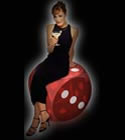In seven card stud eight-or-better, when it appears that someone has a low hand, it becomes correct to call with almost any pair.
But you never value-bet your big pairs in this spot. Similarly, if you are going for low and someone holding an obvious big pair checks to you, you should bet your hand for value.
Since it looks as though your are betting a low, your opponent almost always will call with his one pair.
As you can see, there are many opportunities in stud omaha eight-or-better for value bets on the end.
In many games, especially tights games, a large part of your profit easily can come from these seventh-street bets.
This discussion on betting for value illustrates another important concept: You cannot bluff a high hand with any hand that looks as though you are going low.
The only way you could get away with this is if you catch an ace along the way and come out betting or check-raising when you don’t have the possible low made.
For example, suppose you bust out on fourth street, catch an ace on Fifth Street, and then check-raise.
You opponent might think you have made aces, and this may enable you to bluff out a pair on the end, when actually you have made this play with four low card.
However, there are a few situations where you should bet as a bluff. As an example, suppose you have and are against one opponent who shows notice that you are beat for high and that you also might be beat for low.














Nevertheless, betting is correct. If your opponent busts out on the end, or perhaps makes only a small pair, there is a good chance that he will fold, especially if the pot is not big.
This bet may permit you to win the whole pot instead of getting only half of it. As you can see, there are advantages to disguising your hand.
If your opponent thinks you have a low when you actually have a high, expect to get pair off.
And sometimes when you are going low, if you make your opponent think you are going high, you can bluff him out if you miss your low.
Keep in mind that this type of bluffing play is risky and is usually successful only in the tighter games against tighter, but not necessarily better, players.
However, some of the better players will fold too often in these spots, as they do not see this type of play very often.
Introduction / General Strategy / How Far Do You Go? / Fourth Street / Check-Raising on Fourth and Fifth Streets / Fifth Street / Sixth Street / Seventh Street / Afterthought


